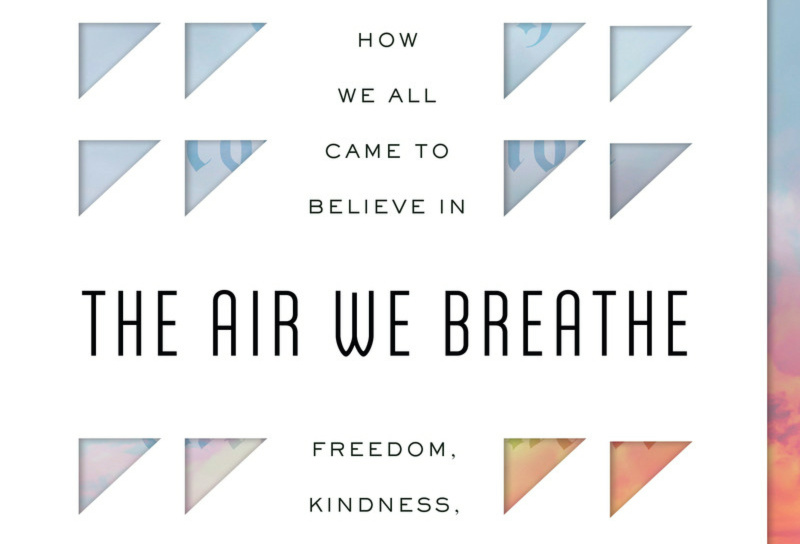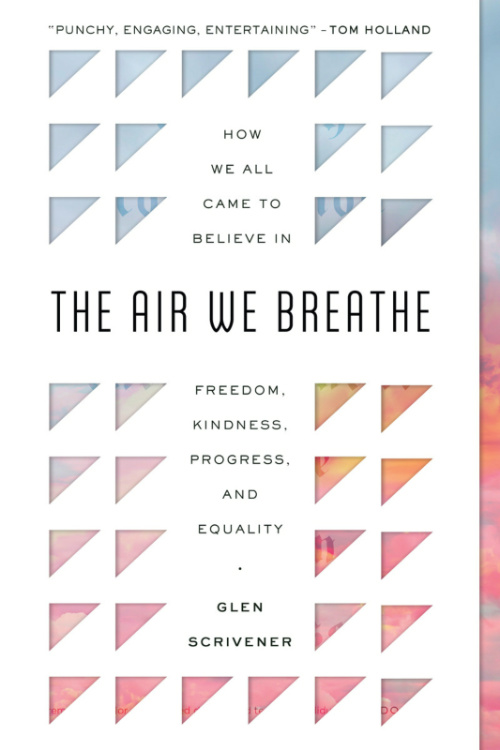
DAVID ADAMS reads Glen Scrivener’s ‘The Air We Breathe’…
Glen Scrivener
The Air We Breathe: How We All Came To Believe In Freedom, Kindness, Progess and Equality
The Good Book Company, UK, 2022
ISBN-13: 978-1784987497

“[T]he strength of Scrivener’s book lies not so much in the arguments he presents – many of them can be found elsewhere – but in the engaging way he brings them together in a manageable whole.”
Amid the growth in what statisticians refer to as the “nones” (people who identify with no religion or faith), there are many who may be unaware of the influence of Christianity in Western societies today. UK-based Australian Anglican priest Glen Scrivener, director of the evangelistic charity Speak Life, aims to correct that with a book he says is all about “a chance to slow down and pay attention to the profoundly Christian atmosphere you inhabit”.
His thesis is essentially that, whether people identify with Christianity or not, many of the values we consider to be “self-evident” in the West find their roots in the Christian faith. Or, as he summarises it in just two sentences: “The extraordinary impact of Christianity is seen in the fact that you don’t notice it. You already hold particularly ‘Christian-ish’ views, and the fact that you think of these values as natural, obvious or universal shows how profoundly the Christian revolution has shaped you.”
Scrivener starts the book in earnest with a chapter showing how different the attitudes of early Christ-followers were from the prevailing [Roman] culture of the time. Not to mention how shocking the Christian claim that “God himself had hung on a cross” would have been, something Paul himself refers to when he wrote in I Corinthians 1:18 that “the message of the cross is foolishness. But to us who are being saved it is the power of God.”
We are then led through a series of chapters, each of which explores one of seven “values” – equality, compassion, consent, enlightenment, science, freedom and progress – and draws on the impact Christianity has had in defining them through the period stretching from, as he states it, “Genesis to George Floyd”. In these chapters, Scrivener considers Biblical texts as well as the views of everyone from Plato to second century Christian critic Celsus, contemporary atheist Sam Harris to St Augustine, and, Galileo to abolitionist Frederick Douglass.
The book closes with a couple of chapters looking at how these values are operating in society today and what happens when they are divorced from Christianity – or more specifically, from Christ – as evidenced in, for example, the rise of ‘cancel culture’.
“Such values were never ultimate in Christianity,” he writes. “Christian morals have always been the morals to a story. In the West today we have ditched the story, anonymised the Hero and kept the morals – and now we wonder why our culture splinters under a million angry accusations. The kingdom without the King is not a place of liberation so much as a place of judgment. But in this democratic republic, we are all the judges, and we are all the judged. We desperately need a person above and beyond the values – a person who does not simply expect our best but who forgives our worst.”
There’s depth in these pages but lightness at times and even humour – at one point, Scrivener, arging that there is a “bottom-up-ness and top-down-ness” to humans, goes on to describe humanity as “dirt-bags kissed by heaven” while at another he describes turning up to a preaching gig to find the title of his sermon – “What does it look like when God shows up?” – on a poster beside an image of his own face (“This could only be a profound disappointment to people,” he notes).
But it’s the central theme – the contribution Christianity has made to shaping, what is in essence, right and wrong in our world today – that will stick with the reader as chapter-by-chapter Scrivener mounts his case. And while he doesn’t shy away from the ugliness of what Christians have at times said and done, the weight of the evidence he presents in support of the argument that Christianity has shaped so much of what we hold dear as “Western values” is undeniable.
The strength of Scrivener’s book lies not so much in the arguments he presents – many of them can be found elsewhere – but in the engaging way he brings them together in a manageable whole.
The Air We Breathe – which Scrivener hopes will be of interest to the “nones”, the “dones” (those who feel they have moved on from Christianity) and the “won” (those who are Christians already) – should serve as a great conversation starter for anyone who has at least a passing interest in the Christian faith and its impact on the world we live in today.





